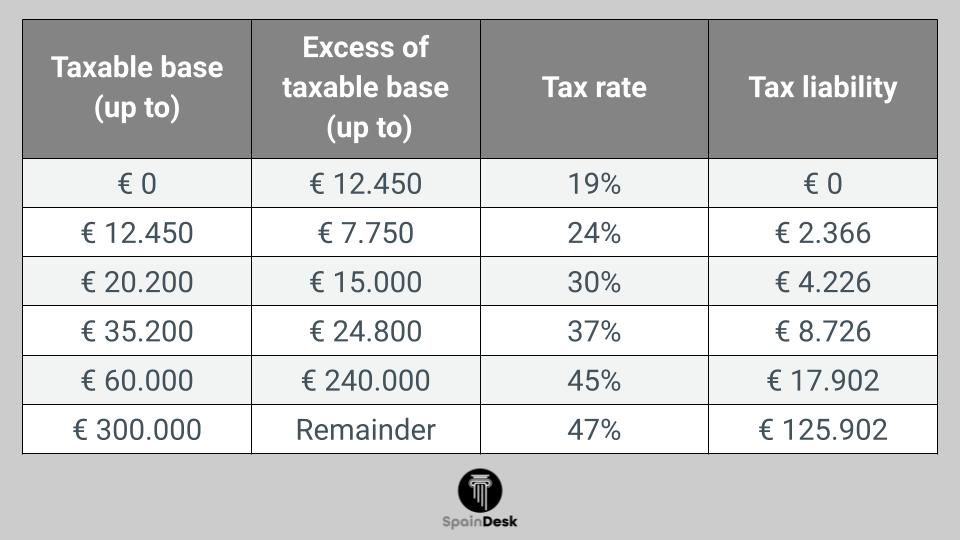Income Tax in Spain in 2021: The Essential Guide
On the one hand, personal income tax in Spain is a complicated and, at times, confusing and lengthy process. On the other hand, understanding personal income taxes and your liability is crucial to avoid severe fines. Income tax is one of the most common taxes in Spain. This is an introductory guide to begin navigating what the personal income tax is, the rates, due dates, and penalties.
Content
What is personal income tax?
Personal income tax in Spain or Impuesto de Renta sobre las Personas Físicas (IRPF) is a direct tax on an individuals personal income. It is not the same as corporate income tax. Spanish personal income taxes are divided between the state and the autonomous regions. Although the state has created simplified tax thresholds, the rates and tax bands will vary depending on the autonomous region you’re located in.
To get started, you’re required to apply for a tax identification number known as an NIE number. Citizens of the EU usually need to apply for this number after three months of residency in the country, while citizens from countries outside the EU will generally receive their application with their Spanish residency.
Get taxes done more quickly and efficiently with our tax services in Spain
Who pays income tax in Spain?
Even if you’re not a legal resident of Spain, you could still be considered a tax resident. You must file your income tax returns in the country if you meet any of the following requirements:
- Have spent more than 183 calendar days per year within the country.
It’s important to note that short absences will be considered a part of this number unless you have proof of your tax residence in another country. - You have a spouse or dependents who are tax residents of Spain.
- If you have a business or economic interests located within the country. For example, if you are starting a business in Spain, you will pay income tax in Spain.
Additionally, if you have a Spanish address, licence plate, phone number, bank account, or have used the healthcare system you could also be considered a tax resident unless you can prove otherwise.
Spanish tax for residents
For those employed by Spanish resident companies, the employer is required to withhold an amount of your taxable income to essentially pre-pay your tax returns. The deductions from your paycheck are an estimate of what will be paid at the end of the tax year. Authorities will then deduct these amounts from your final tax bill and refund any excess amounts paid.
In addition, tax residents of Spain are also obligated to declare any assets held outside of the country through the Modelo 720. This includes bank accounts in your name (or that you manage), insurance, real estate, and more.
Tax in Spain for non-residents
Non-residents of Spain are also taxed on income earned in the country. Typically this is a 24% flat rate on work income and 19% on capital gains and investment income earned in Spain. Next to this, it is important to note that tax returns for non-residents must be filed on an individual basis and not submitted jointly with a spouse.
Earnings subject to income tax in Spain
There are several different sources that Spanish tax residents are required to pay income taxes from. Two types of taxable income need to be taken into consideration when filing your taxes are the general taxable income (renta general) and savings income (renta del ahorro).
Taxes on general income
Spanish tax residents are liable to pay taxes on all worldwide income aside from savings income. This is inclusive of your salary, pension, rent, gambling winnings, etc.
Two parts make up the Income Tax in Spain, a national and regional tax. Generally, the percentages are the same; however, they may vary slightly depending on the region you’re located in. The progressive income tax table is as follows:

Taxes on savings and investments
If you are a Spanish tax resident, you will also be taxed on your worldwide savings and investments. This includes the following:
- Interest gained on savings
- Dividends and income gained from holding interests in companies
- Any income from life and disability policies
- Income from annuities
- Capital gains made from the disposal or transfer of assets
The tax thresholds for savings and investment income are:
- Up to €6,000: 19%
- From €6,000 to €50,000: 21%
- From €50,000 to €200,000: 23%
- Over €200,000: 26%
Taxes on rental income
In addition to the previously mentioned income taxes, you are also liable to pay a tax on rental income in Spain. Any rental payments earned from a Spanish property are subject to a 19% rental income tax for both residents and non-residents from EU or EAA countries. If you are a non-resident not from the EU or EAA countries the flat tax rate is 24%. However, there are a number of deductibles on this tax, including expenses such as house insurance, local property tax, and repairs and management costs. This also includes a yearly 3% depreciation of the property.
Deductions and allowances
Spanish tax residents can enjoy a range of deductions and allowances on their personal income taxes. A standard allowance is granted for anyone under the age of 65 (€5,550), 65 and up (€6,700), and 75 and up (€8,100).
Additionally, if you have dependent children age 25 and under living with you, the following allowances are granted:
- €2,400 for the first child
- €2,700 for the second
- €4,000 for the third
- €4,500 for the fourth
- €2,800 as an additional allowance for each child under the age of three
Furthermore, you can typically claim tax deductions for the following:
- Payments made into the Spanish social security system
- Pension contributions in Spain
- Buying or renovating your home in the country
- Joint tax filings
- Charitable donations
Income Tax Deadlines
In Spain, the personal income tax year coincides with the calendar year. Therefore, the deadline to file your tax return for the previous year is the 30th of June.
Late Submission Penalties
Penalties for late income tax returns are judged on a case-by-case basis but generally include a fine for late submission and additional interest charges. However, you can usually expect something similar to the following interest rates for each timeframe past the due date:
- 3 months or less overdue: 5%
- 3-6 months overdue: 10%
- 6-12 months overdue: 15%
- A year or more overdue: 20%
An interest of 5% is typically charged on top of these amounts for payments that are more than one year overdue. In addition to these interest rates, the fine for late submission is €100 for nil returns. However, if the Tax Office prompts the return, the fine will increase to €200.
Next to this, it’s worth noting that in situations where the return is not made voluntarily, the following penalties will apply in addition to the previously mentioned fines and interest rates:
- Minor infraction: 50% of the tax due
- Serious infraction: 50–100% of the tax due
- Severe infraction: 100–150% of the tax due
How to file your Spanish tax returns
Everyone is obligated to file a Spanish income tax return in the first year of their tax residency in the country. The forms can be submitted online and require your digital identification certificate.
From the second year of tax residency onwards, it’s only necessary for you to file your tax return if you are earning over €22,000 as your employer will have already deducted the taxable amount. It’s important to note that this only applies if you have only one source of income.
Personal Income Tax Advice
If you need professional advice navigating your personal income tax returns in Spain, then contact us at SpainDesk. Our team of qualified tax and legal experts can offer specialized guidance and assistance to ensure your tax returns are filed correctly and on time.
Disclaimer: Information on this page may be incomplete or outdated. Under no circumstances should the information listed be considered as professional legal advice. We highly recommend seeking guidance from a legal expert if you lack extensive knowledge or experience dealing with any of the procedures outlined in these articles.
Get taxes done more quickly and efficiently with our tax services in Spain







